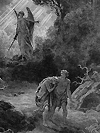|
Eastern Orthodox Church
The second-largest
Christian
communion, consisting of a family of self-governing churches that share
a common theology, liturgical tradition, and adherence to the decisions
of the first seven ecumenical councils. It is rooted in the early
Christian
communities of the Eastern Roman (Byzantine) Empire and formally
separated from the
Roman Catholic Church
during the East–West
Schism of 1054.
The Church emphasizes Holy Tradition, the sacraments, and the divine
liturgy, and is organized into autocephalous (independent) national
churches, each led by a bishop, commonly called a patriarch. The
spiritual and theological heritage of the Eastern Orthodox Church is
heavily influenced by Greek philosophy, Byzantine culture, and
monasticism.

East–West Schism
See
Schism of 1054.

Eden (עֵדֶן)
Hebrew. “Delight”. Name for the garden of God,
where he put
Adam
and
Eve, the first man and woman whom he had created,
to dress it and to keep it, and specifically commanded them not to eat
from the Tree of Knowledge of Good and Evil. After disobeying, they were
expelled from this place. The name Eden, appears only once in the New
Testament in Luke 3:38, called Edem (Ἐδέμ) in Greek, where some
manuscript traditions insert it between
Seth
(Σήθ) and
Adam (Ἀδάμ)
in Jesus’ genealogy, reflecting
Septuagintal
variations, while elsewhere the New Testament does not use the word
directly but evokes its imagery through references to paradise, i.e.
paradeisos (παράδεισος).
See also
Garden of Eden.


Edict of
Milan
A proclamation issued in 313 AD by the Roman
emperors
Constantine I
and
Licinius that granted religious tolerance throughout the Roman
Empire, particularly legalizing
Christianity
and ending the persecution of Christians. It allowed individuals to
freely practice their religion, restored confiscated Christian property,
and marked a turning point in the history of the Roman Empire by
recognizing
Christianity
as a legally protected faith, paving the way for its growth and eventual
dominance within the empire.

Edict of
Thessalonica
A decree issued by Roman emperors
Theodosius I,
Gratian, and Valentinian II on 27 February 380 AD, that declared Nicene
Christianity
the official state religion of the Roman Empire. It recognized the
bishops of Rome and Alexandria as authoritative and mandated that all
subjects adhere to the faith defined by the
Nicene Creed, condemning pagan
practices and heretical
Christian
sects such as
Arianism. The edict marked a
decisive step in the Christianization of the Roman Empire, establishing
a legal framework for the suppression of paganism and reinforcing the
unity of the empire under a single, orthodox
Christian
doctrine.

Enoch (Ἑνώχ)
Name of the son of Jared and the father of
Methuselah, and a descendant of Adam through the line of Seth (Genesis
5:18–24; 1 Chronicles 1:3). In Hebrew his name is Hanokh (חֲנוֹךְ),
which derives from the Hebrew root ḥ-n-k (ח־נ־ך), meaning “to dedicate”
or “initiate”, reflecting a life devoted to God. Enoch is notable for
his exceptional piety: Genesis 5:24 states that “Enoch walked with God,
and he was not, for God took him”, implying that he was taken directly
into divine presence without experiencing death. In Jewish, Christian,
and Islamic traditions, Enoch is regarded as a model of righteousness
and a prophetic figure; in apocryphal literature, particularly the Book
of Enoch, he is attributed with visions and revelations concerning
heaven, angels, and the judgment of the world.

Enos (אֱנוֹשׁ)
Name of the son of
Seth and grandson of Adam (Genesis 4:26; 5:6–11). His name derives from
the Hebrew word ʾenosh (אֱנוֹשׁ), meaning
“mortal man” or “humanity”,
emphasizing human frailty and mortality. Enos is significant in biblical
genealogies as the continuation of the righteous line from Seth, and
Genesis 4:26 notes that “then people began to call upon the name of the
LORD”, linking his time with the emergence of organized worship. In
Jewish, Christian, and Islamic traditions, Enos is regarded as a
patriarchal figure who maintains the covenantal line through which Noah
and subsequent humanity descend. Also transliterated as Enosh.

Enosh (אֱנוֹשׁ)
See
Enos.

Epistles
Twenty-one Christian letters, many written by the
Apostle Paul and known as Pauline epistles, that consist mostly of
counsel and instruction to the early Church. The term comes from the
Greek word epistole (επιστολή), meaning
“letter” and referring to a
usually rather formal and elegant writing directed or sent to a person
or group of persons.

Erasmus
See
Desiderius Erasmus.

’et (את/אֵת/אֶת)
A small but significant term in Biblical Hebrew,
functioning primarily as a definite direct object marker. It consists of
the two letters Alef (א) and Tav (ת), the first and last letters of the
Hebrew alphabet, a feature that has invited both linguistic and mystical
interpretation. Grammatically, אֵת precedes a definite noun to indicate
that it is the object of a verb and is ubiquitous throughout the Torah
and other biblical texts, occurring over 900 times. For example, in
Genesis 1:1, the phrase “B’reishit bara
Elohim et ha-shamayim ve-et ha-aretz” (בְּרֵאשִׁית בָּרָא אֱלֹהִים אֵת
הַשָּׁמַיִם וְאֵת הָאָרֶץ), translated as “In the beginning, God created
the heavens and the earth”, the two occurrences of אֵת serve to mark
“the heavens” and “the earth” as definite objects of the verb “created”.
In less frequent contexts, את functions as a preposition meaning “with”,
often attaching to pronominal suffixes, forming constructions such as
itti (אִתִּי, “with me”), itkha (אִתְּךָ, “with you, masculine”), and
itto (אִתּוֹ, “with him”). Beyond its grammatical function, את carries
rich symbolic and mystical significance. In Jewish mystical traditions,
particularly Kabbalah, the letters Alef and Tav are seen as representing
completeness and totality, encompassing the entirety of creation from
beginning to end. Early Christian theologians similarly noted a symbolic
resonance between את in
Genesis 1:1 and the Greek term Alpha
and Omega (Α Ω) used by Jesus in Revelation 1:8 to declare, “I am the
Alpha and the Omega, the Beginning and the End.” In this reading, אֵת is
seen as a hidden or typological reference to Christ, present in the act
of creation and symbolically spanning all of existence. Every occurrence
of את, therefore, can be understood in a mystical sense as pointing to
divine presence or completeness, though grammatically it functions as a
simple particle marking the definite object. In Paleo-Hebrew script,
Alef–Tav appears as 𐤀𐤕, directly paralleling the Alpha–Omega symbolism
of Greek. Thus, את/אֵת operates simultaneously as a functional element
of Hebrew syntax, a prepositional marker of accompaniment, and a symbol
of theological and mystical significance, particularly in Christian
interpretations that see Christ as the beginning and the end of
creation. Note that in the Masoretic Text, the authoritative Hebrew text
with vowels, the particle את sometimes appears with a Tzere (ֵ ),
a long “e”, under the Alef, as אֵת, and sometimes with a Segol (ֶ ), a
short “e”, as אֶת, depending on phonetic context and cantillation rules.
In practice, אֵת is the default long-vowel form, while אֶת occurs before
certain words or in connected phrases to facilitate smoother
pronunciation. Importantly, the meaning does not change, and both forms
function as the definite direct object marker. The first time it appears
in the Bible with a short “e”, as אֶת, is in
Genesis 1:4.

Euphrates
(Εὐφράτης)
Greek name for a river in the Bible, known in
Hebrew as Perat (פְּרָת), that is mentioned as one of the four rivers
flowing out of the
Garden of Eden (Genesis 2:14) and
is frequently cited as a boundary in biblical narratives. Originating in
the Armenian Highlands and flowing through modern-day Turkey, Syria, and
Iraq, the Euphrates forms part of the fertile crescent and has
historically supported early Mesopotamian civilizations. In the Eden
account, it symbolizes life-giving abundance and divine provision,
flowing alongside the
Pishon,
Gihon, and
Tigris to
water the primordial garden. Throughout the Hebrew Bible, the Euphrates
also functions as a geographical marker for the limits of the Promised
Land (Genesis 15:18) and as a symbol of distant nations and empires in
prophetic literature (e.g., Jeremiah 46:10; Ezekiel 31:3). Its recurring
presence emphasizes both the historical and symbolic importance of
watercourses in sustaining life and framing the narrative of human
civilization.

Eve
English interpretation of the name that
Adam gave
to his wife, who was made from one of his ribs, in order to create a
suitable companion for him. In Hebrew she is named
Hawa (חַוָּה),
meaning “Life” or “Living”, because she would become the mother of all
the living. The statement that she was created from one
of
Adam's ribs has long been an issue of controversy, often fueled by
the popular misbelieve that women indeed have a rib less than men. Women
and men both have twelve pairs of ribs. And this is not contradictory,
as the Bible doesn’t say anything about how many ribs
Adam had before or
after the procedure, nor about how many ribs
Eve had. The assumption
that women had more ribs than men was seemingly made without checking.
And even if
Adam ended up with a rib less, that would not imply that his
children would have missing ribs too, no less than that the children of
a person with an amputated body part would be born with body parts
missing! Besides this, since the ribs are the closest to the hearth, the
text might also be interpreted metaphorically. Through the cunning
temptation of the serpent she violated the commandment of God by eating
from the fruit of the Tree of Knowledge of Good and Evil, which she gave
also unto
Adam. Consequently, both were expelled from the garden of God.

 |